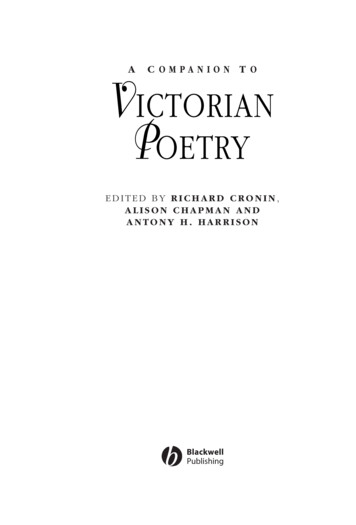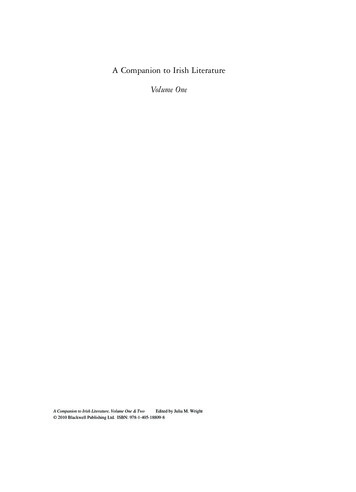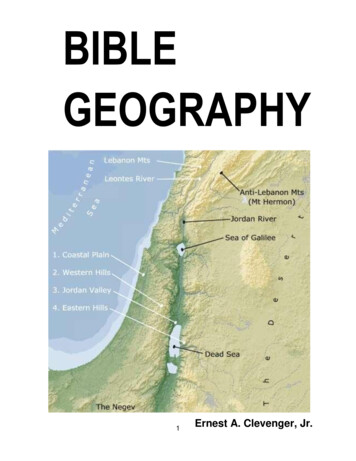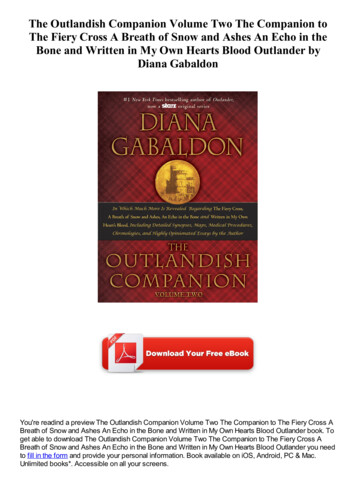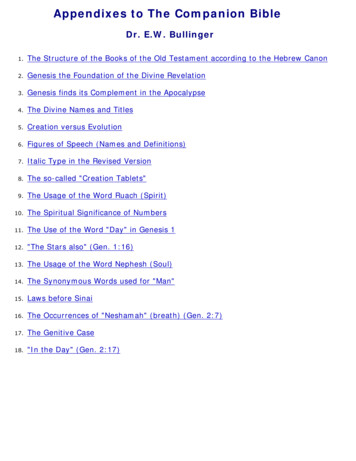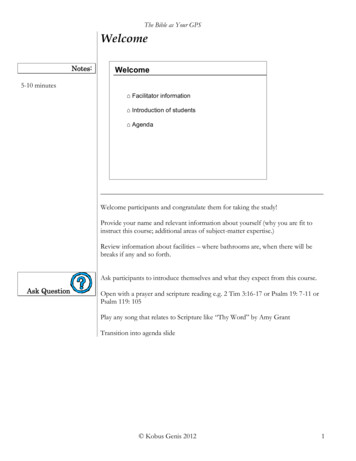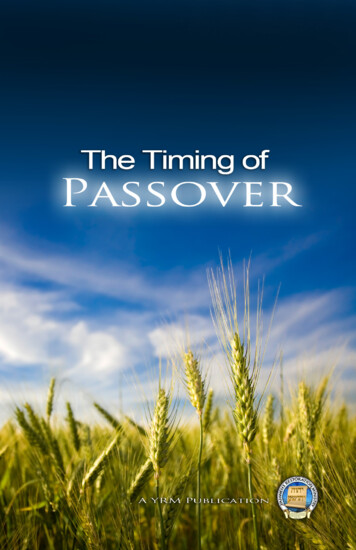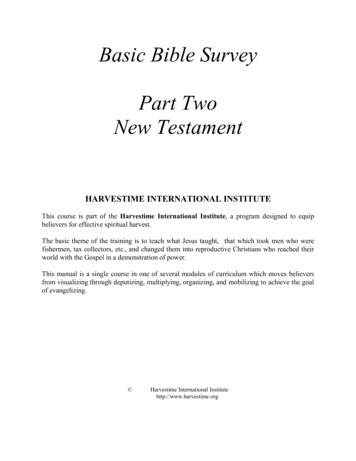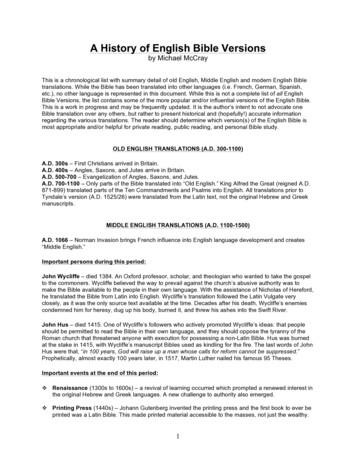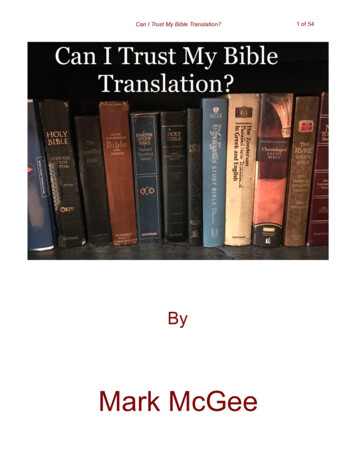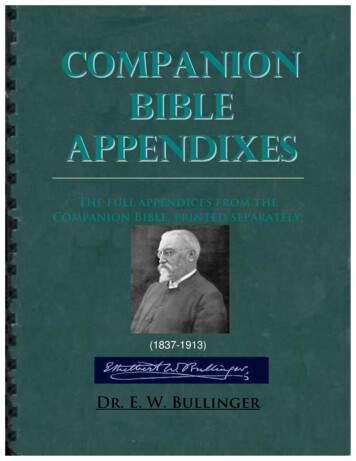
Transcription
CompanionB i bl eA p p e n d i x esThe full appendices from theCompanion Bible, printed separately.(1837-1913)Dr. E. W. Bullinger
Appendixes To The Companion BibleByE.W. BullingerThis work is in the Public Domain. Copy Freely.More Freeware From Bennie Blount Ministries InternationalTable of ContentsThese Appendixes Are From The Companion Bible. The Side Notes And The Appendixes Were Written By E.W.Bullinger. 1. The Structure of the Books of the Old Testament According to the Hebrew Canon.2. Genesis: The Foundation of Divine Revelation.3. Genesis Finds its Complement in the Apocalypse.4. The Divine Names And Titles.5. Creation Versus Evolution.6. Figures of Speech. (Names and Definitions)7. Italic Type in the Revised Version.8. The So-Called "Creation Tablets".9. The Usage of Ruach, Spirit.10. The Spiritual Significance of Numbers.11. The Word "Day" in Genesis 1.12. The Stars Also.13. The Use of Nephesh in the Old Testament.14. The Synonymous Words used for "Man".15. Laws Before Sinai.16. The Occurrences of (Neshamah), "Breath".17. The Genitive Case.18. "In the Day". (Genesis 2:12)19. The Serpent of Genesis 3.20. The Posterity of Cain.21. Enos. "Calling on the Name of the Lord. (Genesis 4:26)22. The Antediluvian Patriarchs, and the Flood-Date. (Genesis 5)23. "The Sons of God" In Genesis 6:2, 4.24. The "Hundred and Twenty Years" of Genesis 6:3.25. "The Nephilim, or "Giants" of Genesis 6.26. Noah "Perfect". (Genesis 6:9)27. Wine.28. Nimrod. (Genesis 10:8, 9 . 1Chronicles 1:10.)29. The Generations of Terah, Isaac, and Jacob.30. The Massorah.31. The Fifteen Extraordinary Points of the Sopherim.32. The 134 Passages where the Sopherim altered "Jehovah" to "Adonai".33. The "Eighteen Emendations" of the Sopherim.34. The Readings Called Severin.35. "Sheol". Hebrew, Sheõl.36. "Thy Salvation". (Genesis 49:18)37. The Pharaohs of Genesis and Exodus.38. "Leaven."39. The Decalogue. Exodus 20:2-1740. THE NAMES OF THE TABERNACLE.
41. The Cherubim.42. The 'Asherah.43. "Offer" and "Offerings".44. "Sin, Trespass, Iniquity," etc.45. The Order and Grouping of The Twelve Tribes.46. Deuteronomy.47. "The Book of The Law."48. The Use of Various Types in the English Bible.49. "The Man of God."51. Money and Coins, Weights and Measures.52. Proper Names.53. The Sieges of Jerusalem.54. The Moabite Stone.55. The Dynasty of Omri.56. Parallel Passages of the Historical Books.57. The Genealogy of the Persian Kings.58. A Harmony of The Ezra-Nehemiah History.59. The Twelve Gates of Jerusalem.60. The Name of Jehovah in the Book of Esther.61. Quotations from the Book of Job in the other Books of the Bible.62. The Septuagint Ending of the Book of Job.63. The Book of Psalms. Miscellaneous Phenomena.64. To the Chief Musician.65. The Psalm Titles, and Words Employed in Them.66. Hebrew Words in the Text of the Psalms.69. Trust.72. The Parenthesis of the Present Dispensation.73. The Ten Words of Psalm 119.77. Chronological Order of the Prophets.79. Isaiah: The Evidences For One Authorship.80. Isaiah. Quotations and Allusions in the New Testament.81. The "Altar to Jehovah in the Land of Egypt". (Isaiah 19:19)82. The The Formulæ of Prophetic Utterance.84. The Septuagint Version of Jeremiah.85. Jeremiah, A Type of The Messiah .86. "The Fourth Year of Jehoiakim". (Jeremiah 25:1-3)(Being supplemental to Appendix 50)89. The Visions of Daniel. (Chapters 7-12) Synchronous90. The "Times", and Numbered "Days" of Daniel. 7:25; 8:14; 12:7, 11, 1291. The "Seventy Weeks" of Daniel. 9:24-2792. References to the Pentateuch in the Prophets.93. The Alleged "Corruption" of the Hebrew Text.94. The Greek Text of the New Testament.96. The Diversity of The Four Gospels.98. The Divine Names and Titles in The New testament.100. The Six Marys.101. The Usage of Pneuma in the New Testament.102. The Synonymous Words for "Will" and "Wish".103. The First Fulfilment of Prophecy in The New Testament. (Matthew 1:22, 23. Isaiah 7:14).104. Prepositions.105. The Usage of Negatives in the New Testament.106. The Synonymous Words for "Appear", "Appearing", etc.107. The Principle Underlying the Quotations From the Old Testament in the New.108. The Synonymous Words for "Child", "Children", etc.109. The Herods of The New Testament.110. The Use of Psuche in the New Testament.
111. The Synonymous Words for "Repent", "Repentance".112. The Synonymous Expressions For "Kingdom".113. The "Kingdom" and The "Church".114. The "Kingdom of Heaven" and The "Kingdom of God".115. "Baptize, "Baptism", etc.116. The Temptations of Our Lord.117. The Lord's Knowledge.118. "If": The Various Conditions Conveyed By Its Use.119. The Fourfold Ministry of Our Lord.120. The Synagogue; and Jewish Sects.121. The Synonymous Words for "Preach" , etc.122. The Synonymous Words for "Judge", "Condemn", etc.123. The Synonymous Words for "Man", "Men".124. The Synonymous Words For "Other", "Another".125. The Synonymous Words for "Perfect". (Adjective and Verb)126. The Eight Beatitudes of Matthew 5, and The Eight Woes of Matthew 23.127. The Synonymous Words for "Poor" etc.128. The Synonymous Words Used for Sin, Wickedness, Evil, Ungodliness, Disobedience, Transgression, etc.129. The Synonymous Words for "World", "Earth", etc.130. The Synonymous Words for "Light", etc.131. The Synonymous Words for "Hell", etc.132. The Synonymous Words for "Know", "Knowledge", etc.133. The Synonymous Words for "See", "Look", "Behold", etc.134. The Synonymous Words for "Pray" and "Prayer".135. The Synonymous Words for "Love".139. "Dead" and "The Dead".140. "The Gospel of the Kingdom" and Other "Gospels".143. "Have Ye Not Read?", (Matthew 12:3, etc.)144. The "Three Days" and "Three Nights" of Matthew 12:40.146. "The Foundation of the World".147. "Thou Art Peter". (Matthew 16:18)153. The Two Entries into Jerusalem.154. "What Think Ye of Christ?" (Matthew 22:42).155. The Two Great Prophecies of "The End of the Age". (Luke 21, Matthew 24, Mark 13)156. "Six Days Before The Passover". (John 12:1)157. The Three Suppers.158. The Two Anointings.159. This Is My Body. (Matthew 26:26)160. The Denials of Peter.161. The Purchase of "The Potters Field" and the Fulfilment of the Prophecy.162. The Cross and Crucifixion.163. The Inscriptions on the Cross.164. The "Others" Crucified With The Lord. (Matthew 27:38 and Luke 23:32)165. The Hours of the Lord's Last Day.166. The Sequence of Events Following the Lord's Resurrection.167. The Three Commissions.168. The Last Twelve Verses of Mark's Gospel.169. Galilee. (Map)170. The Synonymous Words for "Life".171. The Synonymous Words for "Sleep".172. The Synonymous Words for "Power", etc.174. The Synonymous Words for "Send", "Sent", etc.179. Parallel Datings of The Times of Our Lord, Dates of The Begetting, The Nativity, and The Course of Abia.179A. Apostle Paul. (Map)181. The Dispensational Position of the Book of the "Acts".
183. "This is That", (Acts 2:16)184. Synonymous Words For "Grace", etc.186. Church (Greek Ekklesia).190. Synonymous Words for "Servant", "Serve", etc.193. The Mystery.195. The Different Ages and Dispensations of God's Dealings With Men.197. The Revelation.198. The Eternal Purpose, (Ephesians 3:11). The Dispensational Plan of the Bible.Other Notes Found In the Companion Bible. Notes in Genesis Chapter one, 1st. and the 2nd. verses.Notes from Genesis 6:9.Genesis 15:9-18.Notes on Leviticus 20:14.Notes on Numbers 13:22.Notes on Judges 18:30.Notes on 2 Samuel 23:1-5.Notes on 2 Kings 2:15.Notes on Psalm 4:6, 7.Notes on Psalm 21.Notes on Psalm 72.Notes on Psalm 109:5.Notes on Psalm 144:11-15.Notes on Isaiah 45:18.Jeremiah 34:18.The Longer note on Jeremiah 42-44. (The Jews Which Dwell in The Land of Egypt)Notes on Matthew, 6:9, 10Notes on Matthew, 16:6 16:12, 15:26, 15:28, 13:33, and 7:15Notes on Mark 14:51-52.The Longer Note Found On Page 1694. (The Second Postscript Romans 16:25-27)Notes on Galatians 3:20.Notes on Philippians 1:10.Notes on Hebrews 9:16-22.
The Structure of the Books of theOld Testament According to theHebrew CanonThis Is Appendix 1 From The Companion Bible.I. THE LAW (Torah).The beginning. All produced by the Word of God (GenesisA GENESIS.1:3). Israel as a "family" (Genesis 15:1).History. Israel emerging from Families and Tribes to aB EXODUS.Nation. Called "Hebrews" according to their "tongue."Worship. Jehovah in the midst. He, Israel's God;C LEVITICUS.and they, His People.History. Israel, now a "Nation," numbered, and blessedB NUMBERS.as such (23, 24).The end. All depending on the Word of Jehovah.A DEUTERONOMY.Israel regarded as in the "Land."eII. THE PROPHETS (N bi'im)."The Lord of all the earth" givingA JOSHUA.possession of the Land. Government under Priests.JUDGES. Israel forsaking and returning to God;B losing and regaining their position in the Land."No king." Bethlehem. Failure under Priests.Man's king "rejected"; God's kingC SAMUEL.(David) "established." The former ProphetsD KINGS. Decline and Fall under the kings. (Zechariah7:7).D ISAIAH. Final blessing under God's King. TheHuman kings "rejected." David's latterC JEREMIAH."righteous Branch" "raised up."
A EZEKIEL. God forsaking Israel, and returning inB glory, to say for ever of His Land and city"Jehovah-Shammah."MINOR PROPHETS. "The Lord of all the earth"giving restored possession of the Land, and foretellingfinal and unending possession. Prophets. eIII. THE PSALMS (K thubim Writings).ePSALMS. T hillim. "Praises." God's purposes and counsels as to HisA doingsin the future.that is to say, Rules: Words which govern or rule man'sB PROVERBS,life. God's moral government set forth."The end of the Lord" shown in Satan's defeat, and theC JOB.saints deliverance from tribulation.CANTICLES. Virtue rewarded. Read by theat the Passover: the Feast which D Jewscommemorates the deliverance from Pharaoh,the Jews' oppressor.RUTH. The stranger gathered in to hear of,share in, God's goodness in TheE andRedemption. Read at Pentecost, whichcommemorates God's goodness in the Land.LAMENTATIONS. "Alas!" The recordF of Israel's woes. Read at the Fast of the fiveninth of Abib.ECCLESIASTES. "The Preacher." ThePeople collected to hear of man's vanity. E Read at the Feast of Tabernacles, whicheM gillothcommemorates God's goodness in thewilderness.ESTHER. Virtue rewarded. Read at the Feast ofD Purim, which commemorates the deliverance from Haman, "the Jews' enemy.""God's judgment." Here are shown the final defeat ofC DANIEL.Antichrist, and the deliverance out of "the Great Tribulation."Men who governed and ruled God's People inB EZRA-NEHEMIAH.their resettlement in the Land.
A CHRONICLES. Dibrae hayyamim. "Words of the Days"; or, God'spurposes and counsels as to Israel's doings in the past, and until the timeof the end.Appendix List
Table of ContentsThese Appendixes Are From The Companion Bible. The Side Notes And The Appendixes Were Written By E.W.Bullinger. 1. The Structure of the Books of the Old Testament According to the Hebrew Canon.2. Genesis: The Foundation of Divine Revelation.3. Genesis Finds its Complement in the Apocalypse.4. The Divine Names And Titles.5. Creation Versus Evolution.6. Figures of Speech. (Names and Definitions)7. Italic Type in the Revised Version.8. The So-Called "Creation Tablets".9. The Usage of Ruach, Spirit.10. The Spiritual Significance of Numbers.11. The Word "Day" in Genesis 1.12. The Stars Also.13. The Use of Nephesh in the Old Testament.14. The Synonymous Words used for "Man".15. Laws Before Sinai.16. The Occurrences of (Neshamah), "Breath".17. The Genitive Case.18. "In the Day". (Genesis 2:12)19. The Serpent of Genesis 3.20. The Posterity of Cain.21. Enos. "Calling on the Name of the Lord. (Genesis 4:26)22. The Antediluvian Patriarchs, and the Flood-Date. (Genesis 5)23. "The Sons of God" In Genesis 6:2, 4.24. The "Hundred and Twenty Years" of Genesis 6:3.25. "The Nephilim, or "Giants" of Genesis 6.26. Noah "Perfect". (Genesis 6:9)27. Wine.28. Nimrod. (Genesis 10:8, 9 . 1Chronicles 1:10.)29. The Generations of Terah, Isaac, and Jacob.30. The Massorah.31. The Fifteen Extraordinary Points of the Sopherim.32. The 134 Passages where the Sopherim altered "Jehovah" to "Adonai".33. The "Eighteen Emendations" of the Sopherim.34. The Readings Called Severin.35. "Sheol". Hebrew, Sheõl.36. "Thy Salvation". (Genesis 49:18)37. The Pharaohs of Genesis and Exodus.38. "Leaven."39. The Decalogue. Exodus 20:2-1740. THE NAMES OF THE TABERNACLE.41. The Cherubim.42. The 'Asherah.43. "Offer" and "Offerings".44. "Sin, Trespass, Iniquity," etc.45. The Order and Grouping of The Twelve Tribes.46. Deuteronomy.47. "The Book of The Law."48. The Use of Various Types in the English Bible.49. "The Man of God."
51. Money and Coins, Weights and Measures.52. Proper Names.53. The Sieges of Jerusalem.54. The Moabite Stone.55. The Dynasty of Omri.56. Parallel Passages of the Historical Books.57. The Genealogy of the Persian Kings.58. A Harmony of The Ezra-Nehemiah History.59. The Twelve Gates of Jerusalem.60. The Name of Jehovah in the Book of Esther.61. Quotations from the Book of Job in the other Books of the Bible.62. The Septuagint Ending of the Book of Job.63. The Book of Psalms. Miscellaneous Phenomena.64. To the Chief Musician.65. The Psalm Titles, and Words Employed in Them.66. Hebrew Words in the Text of the Psalms.69. Trust.72. The Parenthesis of the Present Dispensation.73. The Ten Words of Psalm 119.77. Chronological Order of the Prophets.79. Isaiah: The Evidences For One Authorship.80. Isaiah. Quotations and Allusions in the New Testament.81. The "Altar to Jehovah in the Land of Egypt". (Isaiah 19:19)82. The The Formulæ of Prophetic Utterance.84. The Septuagint Version of Jeremiah.85. Jeremiah, A Type of The Messiah .86. "The Fourth Year of Jehoiakim". (Jeremiah 25:1-3)(Being supplemental to Appendix 50)89. The Visions of Daniel. (Chapters 7-12) Synchronous90. The "Times", and Numbered "Days" of Daniel. 7:25; 8:14; 12:7, 11, 1291. The "Seventy Weeks" of Daniel. 9:24-2792. References to the Pentateuch in the Prophets.93. The Alleged "Corruption" of the Hebrew Text.94. The Greek Text of the New Testament.96. The Diversity of The Four Gospels.98. The Divine Names and Titles in The New testament.100. The Six Marys.101. The Usage of Pneuma in the New Testament.102. The Synonymous Words for "Will" and "Wish".103. The First Fulfilment of Prophecy in The New Testament. (Matthew 1:22, 23. Isaiah 7:14).104. Prepositions.105. The Usage of Negatives in the New Testament.106. The Synonymous Words for "Appear", "Appearing", etc.107. The Principle Underlying the Quotations From the Old Testament in the New.108. The Synonymous Words for "Child", "Children", etc.109. The Herods of The New Testament.110. The Use of Psuche in the New Testament.111. The Synonymous Words for "Repent", "Repentance".112. The Synonymous Expressions For "Kingdom".113. The "Kingdom" and The "Church".114. The "Kingdom of Heaven" and The "Kingdom of God".115. "Baptize, "Baptism", etc.116. The Temptations of Our Lord.117. The Lord's Knowledge.118. "If": The Various Conditions Conveyed By Its Use.119. The Fourfold Ministry of Our Lord.
120. The Synagogue; and Jewish Sects.121. The Synonymous Words for "Preach" , etc.122. The Synonymous Words for "Judge", "Condemn", etc.123. The Synonymous Words for "Man", "Men".124. The Synonymous Words For "Other", "Another".125. The Synonymous Words for "Perfect". (Adjective and Verb)126. The Eight Beatitudes of Matthew 5, and The Eight Woes of Matthew 23.127. The Synonymous Words for "Poor" etc.128. The Synonymous Words Used for Sin, Wickedness, Evil, Ungodliness, Disobedience, Transgression, etc.129. The Synonymous Words for "World", "Earth", etc.130. The Synonymous Words for "Light", etc.131. The Synonymous Words for "Hell", etc.132. The Synonymous Words for "Know", "Knowledge", etc.133. The Synonymous Words for "See", "Look", "Behold", etc.134. The Synonymous Words for "Pray" and "Prayer".135. The Synonymous Words for "Love".139. "Dead" and "The Dead".140. "The Gospel of the Kingdom" and Other "Gospels".143. "Have Ye Not Read?", (Matthew 12:3, etc.)144. The "Three Days" and "Three Nights" of Matthew 12:40.146. "The Foundation of the World".147. "Thou Art Peter". (Matthew 16:18)153. The Two Entries into Jerusalem.154. "What Think Ye of Christ?" (Matthew 22:42).155. The Two Great Prophecies of "The End of the Age". (Luke 21, Matthew 24, Mark 13)156. "Six Days Before The Passover". (John 12:1)157. The Three Suppers.158. The Two Anointings.159. This Is My Body. (Matthew 26:26)160. The Denials of Peter.161. The Purchase of "The Potters Field" and the Fulfilment of the Prophecy.162. The Cross and Crucifixion.163. The Inscriptions on the Cross.164. The "Others" Crucified With The Lord. (Matthew 27:38 and Luke 23:32)165. The Hours of the Lord's Last Day.166. The Sequence of Events Following the Lord's Resurrection.167. The Three Commissions.168. The Last Twelve Verses of Mark's Gospel.169. Galilee. (Map)170. The Synonymous Words for "Life".171. The Synonymous Words for "Sleep".172. The Synonymous Words for "Power", etc.174. The Synonymous Words for "Send", "Sent", etc.179. Parallel Datings of The Times of Our Lord, Dates of The Begetting, The Nativity, and The Course of Abia.179A. Apostle Paul. (Map)181. The Dispensational Position of the Book of the "Acts".183. "This is That", (Acts 2:16)184. Synonymous Words For "Grace", etc.186. Church (Greek Ekklesia).190. Synonymous Words for "Servant", "Serve", etc.193. The Mystery.195. The Different Ages and Dispensations of God's Dealings With Men.197. The Revelation.198. The Eternal Purpose, (Ephesians 3:11). The Dispensational Plan of the Bible.
Other Notes Found In the Companion Bible. Notes in Genesis Chapter one, 1st. and the 2nd. verses.Notes from Genesis 6:9.Genesis 15:9-18.Notes on Leviticus 20:14.Notes on Numbers 13:22.Notes on Judges 18:30.Notes on 2 Samuel 23:1-5.Notes on 2 Kings 2:15.Notes on Psalm 4:6, 7.Notes on Psalm 21.Notes on Psalm 72.Notes on Psalm 109:5.Notes on Psalm 144:11-15.Notes on Isaiah 45:18.Jeremiah 34:18.The Longer note on Jeremiah 42-44. (The Jews Which Dwell in The Land of Egypt)Notes on Matthew, 6:9, 10Notes on Matthew, 16:6 16:12, 15:26, 15:28, 13:33, and 7:15Notes on Mark 14:51-52.The Longer Note Found On Page 1694. (The Second Postscript Romans 16:25-27)Notes on Galatians 3:20.Notes on Philippians 1:10.Notes on Hebrews 9:16-22.
Genesis: The Foundation ofDivine Revelation.This Is Appendix 2 From The Companion Bible.Genesis is the seed-plot of the whole Bible. It is essential to thetrue understanding of its every part. It is the foundation on whichDivine Revelation rests; and on which it is built up. It is not only thefoundation of all Truth, but it enters into, and forms part of, allsubsequent inspiration; and is at once the warp and woof of HolyWrit.Genesis is quoted or referred to sixty times in the New Testament;and Divine authority is set like a seal on its historical facts. SeeMatthew 19:4-6; 24:37-39. Mark 7:4,10; 10:3-8. Luke 11:49-51; 17:2629,32. John 1:51; 7:21-23; 8:44-56.It, and the Book of the Law, of which it forms part, are ascribed toMoses. See Deuteronomy 31:9,10,24-26. Joshua 1:7; 8:32,35; 23:6.1Kings 14:6; 23:25. 2Chronicles 23:18; 30:16; 34:14. Ezra 3:2; 7:6.Nehemiah 8:1. Daniel 9:11,13. Malachi 4:4. Mark 12:26. Luke 2:22.John 7:23. Acts 13:39; 15:5; 28:23. 1Corinthians 9:9. Hebrews 10:28.Appendix List
Genesis Finds its Complementin the Apocalypse.This Is Appendix 3 From The Companion Bible.GENESIS.1. Genesis, the book ning.The Earth created (1:1).Satan's first rebellion.Sun, moon and stars for theEarth's government (1:1416).Sun to govern the day(1:16).Darkness called night (1:5).Waters called seas (1:10).A river for Earth's blessing(2:10-14).Man in God's image (1:26).Entrance of sin (3).Curse pronounced(3:14,17).Death entered (3:19).Cherubim, first mentionedin connection with man(3:24).Man driven out from Eden(3:24).Tree of life guarded (3:24).Sorrow and suffering enter(3:17).Man's religion, art, andscience, resorted to forenjoyment, apart from God(4).Nimrod, a great rebel andking, and hidden anti-God,the founder of Babylon(10:8,9).APOCALYPSE.1. Apocalypse, the book of the end.2. The Earth passed away (21:1).3. Satan's final rebellion (20:3,710).4. Sun, moon, and stars, connectedwith Earth's judgement (6:13;8:12; 16:8).5. No need of the sun (21:23).6. "No night there" (22:5).7. "No more sea" (21:1).8. A river for the New Earth(22:1,2).9. Man headed by one in Satan's10.11.12.13.14.15.16.17.18.image (13).Development and end of sin(21,22)."No more curse" (22:3)."No more death" (21:4).Cherubim, finally mentioned inconnection with man (4:6).Man restored (22)."Right to the Tree ofLife" (22:14).No more sorrow (21:4).Man's religion,luxury, art, andscience, in their full glory,judged and destroyed by God(18).The Beast, the great rebel, aking, and manifested anti-God,
19. A flood from God to20.21.22.23.24.25.26.27.28.29.30.destroy an evil generation(6:9).The Bow, the token ofGod's covenant with theEarth (9:13).Sodom and Egypt, theplace of corruption andtemptation (13,19).A confederacy againstAbraham's peopleoverthrown (14).Marriage of first Adam(2:18-23).A bride sought forAbraham's son (Isaac) andfound (24).Two angels acting for Godon behalf of His people(19).A promised seed to possessthe gate of his enemies(22:17).Man's dominion ceased andSatan's begun (3:24).The old serpent causingsin, suffering, and death(3:1).The doom of the oldserpent pronounced (3:15).Sun, moon, and stars,associated with he reviver of Babylon (13-18).A flood from Satan to destroy anelect generation (12).The Bow, betokening God'sremembrance of His covenantwith the Earth (4:3; 10:1).Sodom and Egypt again:(spiritually representingJerusalem) (11:8).A confederacy againstAbraham's seed overthrown(12).Marriage of last Adam (19).A Bride made ready and broughtto Abraham's Son (19:9) SeeMatthew 1:1.Two witnesses acting for Godon behalf of His People (11).The promised seed coming intopossession (11:18).Satan's dominion ended, andman's restored (22).The old serpent bound for 1,000years (20:1-3).The doom on the old serpentexecuted (20:10).Sun, moon, and stars, associatedagain with Israel (12).Appendix List
The Divine Names AndTitlesThis Is Appendix 4 From The Companion Bible.I. ELOHIM occurs 2,700 times. Its first occurrence connects itwith creation, and gives it its essential meaning as the Creator. Itindicates His relation to mankind as His creatures (see note on2Chronicles 18:31, where it stands in contrast with Jehovah asindicating covenant relationship). ‘Elohim is God the Son, theliving "Word" with creature form to create (John 1:1. Colossians1:15-17. Revelation 3:14); and later, with human form to redeem(John 1:14 ). "Begotten of His Father before all worlds; born ofHis mother, in the world." In this creature form He appeared to thePatriarchs, a form not temporally assumed. ‘Elohim in indicated(as in the Authorized Version) by ordinary small type, "God". Seetable below.II. JEHOVAH. While Elohim is God as the Creator of allthings, Jehovah is the same God in covenant relation to thosewhom He has created (compare 2Chronicles 18:31). Jehovahmeans the Eternal, the Immutable One, He Who WAS, and IS,and IS TO COME. The Divine definition is given in Genesis21:33. He is especially, therefore, the God of Israel; and the Godof those who are redeemed, and are thus now "in Christ". We cansay "My God," but not "My Jehovah", for Jehovah is "My God."Jehovah is indicated (as in Authorized Version) by small capitalletters, "LORD"; and by "GOD" When it occurs in combinationwith Adonai, in which case LORD GOD Adonai Jehovah.The name Jehovah is combined with ten other words, whichform what are known as "the Jehovah Titles."They are as follows in the order in which they occur in theHebrew Canon (Appendix 1). All are noted in the margin, in alltheir occurrences:1. JEHOVAH-JIREH Jehovah will see, or provide. Genesis22:14.2. JEHOVAH-ROPHEKA Jehovah that healeth thee. Exodus15:26.3. JEHOVAH-NISSI Jehovah my banner. Exodus 17:15.4. JEHOVAH-MeKADDISHKEM Jehovah that doth sanctify
5.6.7.8.9.10.you. Exodus 31:13. Leviticus 20:8, 21:8, 22:32. Ezekiel20:12.JEHOVAH-SHALOM Jehovah [send] peace. Judges 6:24.JEHOVAH-ZeBA’OTH Jehovah of hosts. 1Samuel 1:3, andfrequently.JEHOVAH-ZIDKENU Jehovah our righteousness. Jeremiah23:6, 33:16.JEHOVAH-SHAMMAH Jehovah is there. Ezekiel 48:35.JEHOVAH-‘ELYON Jehovah most high. Psalms 7:17, 47:2,97:9.JEHOVAH-RO‘I Jehovah my Shepherd. Psalms 23:1.We have seven of these, experimentally referred to, in Psalms 23,inasmuch as Jehovah, as the "Good," "Great," and "ChiefShepherd," is engaged, in all the perfection of His attributes, onbehalf of His sheep:In verse 1, we have number 1 above.In verse 2, we have number 5.In verse 3, we have numbers 2 and 7.In verse 4, we have number 8.In verse 5, we have numbers 3 and 4.III. JAH is Jehovah in a special sense and relation. Jehovah ashaving BECOME our Salvation (first occurrence Exodus 15:2), HeWho IS, and WAS, and IS TO COME. It occurs 49 times (7x7.See Appendix 10). Jah is indicated by type thus: Lord.IV. EL is essentially the Almighty, though the word is never sorendered (see below, "Shaddai"). EL is Elohim in all His strengthand power. It is rendered "God" as Elohim is, but El is God theOmnipotent. Elohim is God the Creator putting His omnipotenceinto operation. Eloah (see below) is God Who wills and orders all,and Who is to be the one object of the worship of His people. El isthe God Who knows all (first occurrence Genesis 14:18-22) andsees all (Genesis 16:13) and that performeth all things for Hispeople (Psalms 57:2); and in Whom all the Divine attributes areconcentrated.El is indicated in this edition by type in large capital letters, thus:"GOD." It is sometimes transliterated in proper namesImmanu-’el, Beth-’el, etc., where it is translated, as explained inthe margin.V. ELOAH is Elohim, Who is to be worshipped. Eloah is God in
connection with His Will rather than His power. The firstoccurrence associates this name with worship (Deuteronomy32:15,17). Hence it is the title used whenever the contrast (latent orexpressed) is with false gods or idols. Eloah is essentially "theliving God" in contrast to inanimate idols.Eloah is rendered "God", but we have indicated it by type thusGOD.VI. ELYON first occurs in Genesis 14:18 with El, and isrendered "the most high (God)". It is El and Elohim, not as thepowerful Creator, but as "the possessor of heaven and earth."Hence the name is associated with Christ as the Son of "theHighest" (Luke 1:35).It is Elyon, as possessor of the earth, Who divides the nations"their inheritance". In Psalms 83:18, He is "over all the earth". Thetitle occurs 36 times (6x6, or 62. See appendix 10).Elyon is the Dispenser of God’s blessings in the earth; theblessings proceeding from a Priest Who is a King upon His throne(compare Genesis 14:18-22 with Zechariah 6:13, 14:9).VII. SHADDAI is in every instance translated "Almighty", andis indicated by small capital letters ("ALMIGHTY"). It is God (El),not as the source of strength, but of grace; not as Creator, but asthe Giver. Shaddai is the All-bountiful. This title does not refer toHis creative power, but to His power to supply all the needs of Hispeople. Its first occurrence is in Genesis 17:1, and is used to showAbraham that He Who called him out to walk alone before Himcould supply all his need. Even so it is the title used in2Corinthians 6:18, where we are called to "come out" in separationfrom the world. It is always used in connection with El (seeabove).VIII. ADON is one of three titles (ADON, ADONAI, andADONIM), all generally rendered "Lord"; but each has its ownpeculiar usage and association. They all denote headship invarious aspects. They have to do with God as "over-lord."(1) ADON is the Lord as Ruler in the earth. We have indicatedthis in type by printing the preceding article or pronouns in smallcapitals, not because either are to be emphasised, but todistinguish the word "Lord" from Adonai, which is always soprinted in the Authorized Version.(2) ADONAI is Lord in His relation to the earth; and as carryingout His purposes of blessing in the earth. With this limitation it is
almost equivalent to Jehovah. Indeed, it was from an early date soused, by associating the vowel points of the word Jehovah withAdon, thus converting Adon into Adonai. A list of 134 passageswhere this was deliberately done is preserved and given in theMassorah (§§ 107-115). (See Appendix 32) We have indicatedthese by printing the word like Jehovah, putting an asterisk, thus:LORD*.(3) ADONIM is the plural of Adon, never used of man. Adonimcarries with it all that Adon does, but in a greater and higherdegree; and more especially as owner and proprietor. An Adonmay rule others who do not belong to him. Hence (without thearticle) it is often used of men. But Adonim is the Lord Who rulesHis own. We have indicated it by type, thus: LORD.The three may be thus briefly distinguished:Adon is the Lord as overlord or ruler.Adonim is Lord as owner.Adonai is the Lord as blesser.IX. The TYPES used to indicate the above titles, in the text, are asfollows:God Elohim.GOD Jehovah (in combination with Adonai, "Lord").GOD* Jehovah in the Primitive Texts, altered bySopherim to Elohim as in the Printed Text. (See Appendix 32.)GOD El.GOD Eloah.LORD Jehovah.THE LORD Jah.LORD* Jehovah in the Primitive Text, altered by theSopherim to Adonai as in the Printed
The Dispensational Plan of the Bible. Other Notes Found In the Companion Bible. Notes in Genesis Chapter one, 1st. and the 2nd. verses. Notes from Genesis 6:9. Genesis 15:9-18. Notes on Leviticus 20:14. Notes on Numbers 13:22. Notes on Judges 18:30. Notes on 2 Samuel 23:1-5. Notes on 2 Kings 2:15. Notes on Psalm 4:6, 7.
